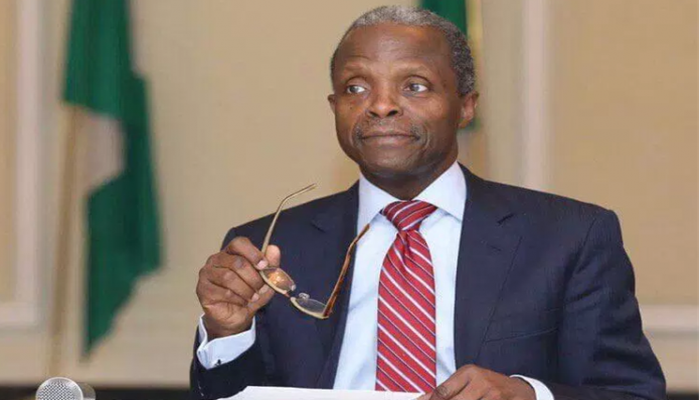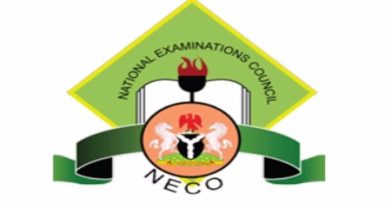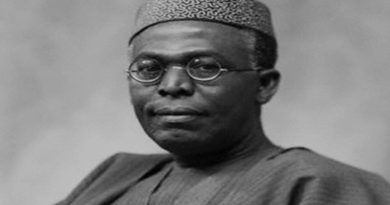Osinbajo explains why Nigeria is leading regional effort to save Lake Chad
*Says, saving the Lake Chad is pulling the region back from a major economic, social and ecological disaster
*Urges inclusion, integration of local communities, civil society groups in the design, implementation of interventions for the restoration of the Lake Chad Basin.
“The world will pay a steep price if stakeholders choose to resort to unilateral actions and the pursuit of selfish interests; if we collectively fail to rise boldly to this challenge.
“Saving the Lake Chad is pulling our region back from a major economic social and ecological disaster. Saving the Lake Chad is restoring and preserving the livelihoods of millions but perhaps more importantly preserving a resource that will be crucial to the economic sustenance and security of the fastest growing population in the world.”
Below is the full text of the speech:
SPEECH DELIVERED BY HIS EXCELLENCY, PROF. YEMI OSINBAJO, SAN, GCON, AT THE OPENING SESSION OF THE INTERNATIONAL CONFERENCE ON LAKE CHAD AT THE TRANSCORP HILTON HOTEL, ABUJA ON MONDAY 26TH FEBRUARY, 2018.
On behalf of the Government and people of Nigeria, I am delighted to welcome you to this crucial International Conference on Lake Chad, with the appropriate theme: “Saving the Lake Chad to Revitalize the Basin’s Ecosystem for Sustainable Livelihood, Security and Development.”
We meet at this conference to deepen local and international awareness of the existential threat to probably over 40 million people in the nations straddled by the Lake Chad, the Republics of Chad, Nigeria, Cameroon, Niger and the Central African Republic, who depend on this water body for their livelihoods. Once the 6th largest lake in the world, providing freshwater and supporting fishing and livestock for centuries, the Lake Chad river basin has now shrunk by 90 percent of its size, from a peak of 25,000 square kilometers to currently about 1,350 square kilometers.
The implications of this are grave indeed. As the Lake has shrunk, and desertification has intensified, large numbers of people, once dependent on the Lake for livelihood – fishing, irrigation for farms, and drinking water for cattle, have been left bereft.
Migration and resettlement have intensified, farmers and fishermen have been confronted with leaner harvests, and pastoralists have been compelled to venture farther in search of food and water for their cattle. That foray deeper southwards has led to the deadly clashes in Nigeria and in parts of West Africa, between herdsmen and farmers. Not surprisingly, the North East of Nigeria and the far west of Chad where the lake is located have in the past several years been the epicenter of the Boko Haram insurgency. The insurgents have been able to draw recruits from a desperate, idle and yet growing youth population.
But this ecological catastrophe is only one side of the story. The other side of this is the determined and commendable work going on to redress it and rewrite the fate of the Lake Chad Basin and its people.
The last thirty years have seen multinational efforts at halting the decline of the Lake and replenishing it. These include:
- Plans by the commission’s member countries to replenish the lake by pumping water from the Congo Basin through the Oubangi River and then on to Lake Chad.
- The Feasibility Study of this Inter Basin water transfer from Congo River to the Lake, which was supported by Nigeria with a grant of USD $5m;
- The approval and implementation of the Lake Chad Basin Commission’s Strategic Action Programme (SAP) in 2008 and its implementation, the creation and fundraising for a five-year Investment Plan (2013-2017), aimed at safeguarding the ecosystem of the basin.
In 2012, the Lake Chad Basin Commission, LCBC, Summit of Heads of State and Government adopted the Lake Chad Basin Water Charter as the legal instrument for sustainable water management of the Lake.
All LCBC member countries have ratified the Charter, except Libya and Central African Republic (CAR) which are in the process of doing so. And most recently, LCBC-member countries have, with support from the World Bank and the French Development Agency, prepared the Lake Chad Development and Climate Resilience Action Plan (LCDAP) for the period covering 2016 to 2025.
Your Excellencies, this International Conference is a follow up to all of these previous efforts and interventions. Over the next two days, this Conference will see experts from around the world deliberate on a wide range of issues relating to the current state and future prospects of Lake Chad: the Lake Chad water transfer and other interventions targeted at restoring the Lake; regional cooperation for peace and security; and funding and investment approaches. This we hope will produce a roadmap that will guide the all-important decision making of the high-level Meeting on Wednesday.
I am particularly delighted that the International Community is beginning to not only see the Lake Chad Basin issue as a challenge with global implications, but also taking steps to actively support the efforts of the member countries of the Lake Chad Basin Commission.
We must therefore thank the United Nations and its agencies, especially UNESCO, which is a co-organizer of this conference, the African Development Bank, the World Bank, and other development partners.
Our gratitude also goes to member countries of the Lake Chad Basin Commission (LCBC), and of the International Commission of the Congo-Oubangui-Sangha Basin (CICOS), as well as other participating nations, for the collective resolve and political will to tackle the environmental challenges affecting the Lake Chad Basin.
Let me also extend appreciation to Nigeria’s Federal Ministry of Water Resources and the Federal Ministry of Environment, who have jointly spearheaded the Nigerian Government’s efforts regarding the restoration of Lake Chad.
The cooperation and collaboration that underpins the efforts to save the Lake Chad must not be allowed to flag. The world will pay a steep price if stakeholders choose to resort to unilateral actions and the pursuit of selfish interests; if we collectively fail to rise boldly to this challenge.
Let me therefore use this opportunity to solicit even greater regional, continental and international support for this cause. We must as a matter of necessity also put greater effort into the inclusion and integration of local communities and civil society groups in the design and implementation of the interventions for the restoration of the Lake Chad Basin.
Your Excellencies, let me assure you of the unflagging commitment of Nigeria – a founding member of the Lake Chad Basin Commission, the country with the largest number of people affected by the fortunes of Lake Chad, and perhaps the biggest contributor to its funding needs so far, – to supporting the implementation of the outcomes of this Conference, and the restoration of the Lake Chad Basin.
Saving the Lake Chad is pulling our region back from a major economic, social and ecological disaster. Saving the Lake Chad is restoring and preserving the livelihoods of millions but perhaps more importantly preserving a resource that will be crucial to the economic sustenance and security of the fastest growing population in the world.
I thank you all for listening, and I wish you fruitful deliberations.
It is now my honour and privilege to declare this Conference open.




